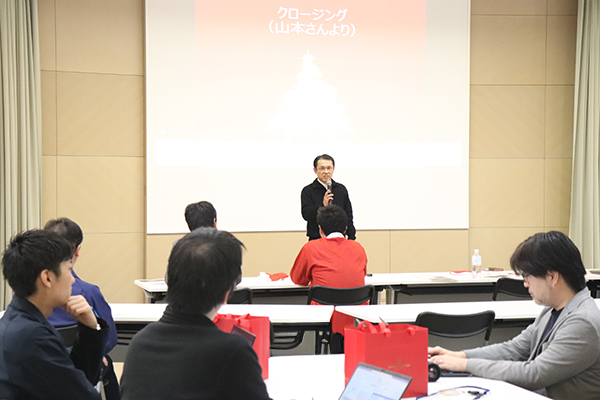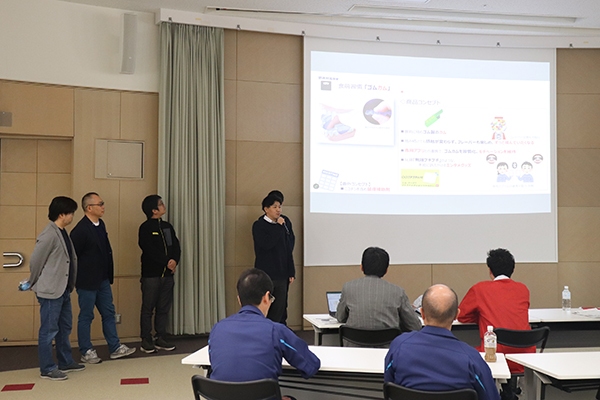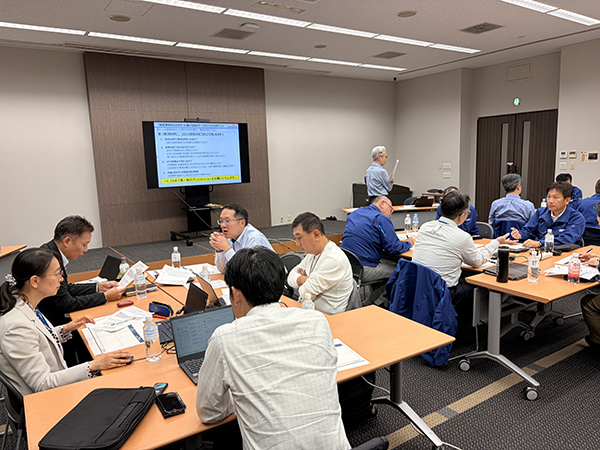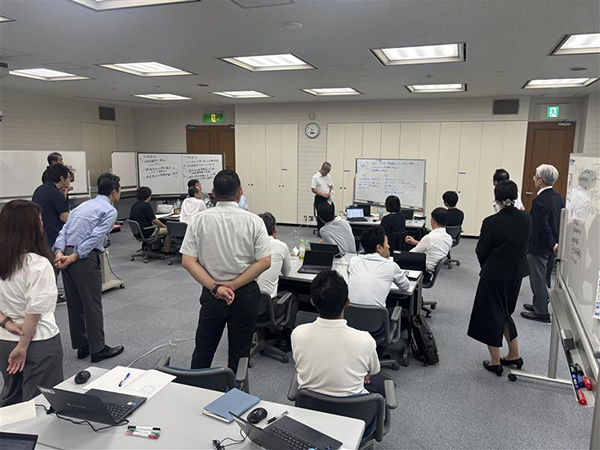We have defined three types of human resources as important themes for human resource development: “senior management human resources” that are capable of rapid decision-making with leadership that can flexibly adapt to changes in this era of volatility, where the future is uncertain and difficult to predict; “innovative human resources” that will continue to provide new value in the future, just as we have created innovations in society based on rubber technology; and “digital transformation (DX)-related human resources” that can create new value by utilizing digital technologies to promote more advanced and efficient decision-making and operations and by applying such technologies to business. We will strive to continuously develop these human resources to enhance our corporate value.
In this rapidly changing VUCA era, flexibility and quick decision-making are essential. Therefore, it is crucial to develop global senior management human resources capable of calmly making decisions even in uncertain situations and acting with foresight.
At the same time, leadership, i.e., the ability to effectively head teams and adapt flexibly to changes, is indispensable.
We aim to build a system that develops individuals who are constantly learning and capable of achieving personal growth.
Sumitomo Rubber has driven innovation by providing new value to society based on rubber technology. Even today, we continue to develop new technologies, such as the “Smart Tyre Concept,”“tire manufacturing utilizing hydrogen energy,” and “vibration control technology employing high-damping rubber.” Moving forward, we will cultivate both the human resources and the corporate culture necessary to continue driving innovation in a new era.
More advanced and efficient decision-making and business execution are needed by leveraging digital technology to fundamentally transform business models and work processes. To successfully carry out this transformation, not only knowledge of digital technologies but also the ability to apply them to business, create new value, and adapt flexibly to change while demonstrating leadership in driving digitalization within the organization will be required. We will establish a system that fosters, retains, and empowers such digital talents.
Starting in 2023, we launched the “Innovation Academy” as our Innovation Talent Development Program. While our previous programs focused primarily on cultivating an entrepreneurial mindset, starting in 2025, we have enhanced the program beyond mindset development. We have expanded it to include methods for generating ideas for full-scale innovation creation, as well as programs for developing business models and new ventures, refining it into the “Innovation Academy 2025.” With the goal of “Strong Passion” and “Bold Challenge” ~ Where Passion Ignites the Future ~, we will further expand this as a company-wide initiative for innovation talent development and new business creation.


In 2021, we transitioned the personnel system for managerial positions from the traditional competency-based qualification system to a role-based grading system, introducing a mechanism where compensation is determined based on job standards. Concurrently, we divided managerial career paths into “Management Track” and “Specialist Track,” enabling career development that leverages specialized expertise.
We hold this event to recognize outstanding initiatives with the aim of enhancing employee motivation, promoting innovation, and fostering a corporate culture that encourages taking on challenges.
Awards are presented in two categories: the Techno-Science Award and the Sustainability Award.
The Techno-Science Award recognizes innovative achievements in areas such as basic research, technology development, equipment development, and production engineering that generate seeds of creativity for the next generation.
The Sustainability Award honors initiatives that contribute to addressing the material issues of the Sumitomo Rubber Group, efforts that advance the realization of our desired future vision, and activities that contribute to delivering social value.
To enable data-driven decision-making company-wide, we are promoting DX literacy education. We have established a training framework covering the three essential DX domains (Business Core, Professional, Data Engineer), achieving participation in DX literacy training for approximately 3,500 staff-level employees by the end of 2024. Furthermore, starting in May 2024, we introduced open badges to certify knowledge, skills, and experience, expanding practical learning opportunities alongside e-learning. We are fostering a virtuous cycle by developing in-house expert instructors and promoting peer-to-peer learning among employees, linking individual growth to enhanced organizational competitiveness.
As part of our DX talent development efforts, we have introduced PBL (Project-Based Learning) to strengthen mechanisms that directly connect learning to practical work. Participants set themes based on actual business challenges and work to create practical deliverables through data preparation, AI model development, application creation, and more. To date, we have advanced over 40 PBL activities. Moving forward, we are further developing mechanisms to foster employee initiative and creativity. This approach ensures both learning retention and value creation, accelerating our DX advancement.
Our company promotes the use of RPA to streamline routine administrative tasks, shift resources toward higher-value-added work, and enhance employees' digital literacy. We have established an environment where employees can develop and utilize RPA tools themselves. We provide training programs enabling development even for those with no prior programming experience. We have particularly strengthened our support system, including flexible e-learning formats, on-demand Q&A via Teams, and sharing internal case studies. By the end of October 2025, 595 employees had completed training, resulting in 857 instances of RPA user development. Combining user-driven RPA development with IT-led RPA development has reduced annual operational hours by 107,000, enabling greater focus on higher-value tasks. This initiative also contributes to enhancing employees' digital literacy. We will continue to promote RPA adoption to further improve operational efficiency while supporting employee skill development. Specifically, we aim to enhance integration with AI to achieve more advanced automation, thereby boosting the company's overall competitiveness.
We are promoting the use of the self-service BI tool “Tableau” to foster a culture that enables swift and sophisticated decision-making through data visualization. Across diverse departments including Manufacturing, SCM, Sales, and Solutions, we are enhancing operational sophistication through streamlined report creation and dashboard analysis, contributing to the establishment of a data-driven culture. To spread this culture, we regularly host internal BI competitions and broadcast the company radio show “Tab Talk” as an information platform, providing employees opportunities to improve their skills while enjoying the process. To further spread this data-driven culture, we introduced the “DATA Saber” certification program, with 30 individuals certified by the end of 2025.
To build a data-driven organization, we have held the “Digital Innovation Day” event annually since 2022 to promote knowledge sharing and communication among users. By sharing DX activities across departments and locations and learning from external case studies, we foster new interactions that drive innovation. In 2025, we held sessions in June and October, with a total participation of approximately 650 people. This initiative extends beyond Japan, operating in our China and Thailand locations as well, playing a crucial role in spreading a data utilization culture globally. We will continue to accelerate DX advancement through ongoing events, serving as a starting point for creating synergies.
We are accelerating the internal adoption of generative AI to enhance and advance operational productivity. As part of this effort, we regularly host internal study sessions called “AI Café,” providing opportunities to learn at various skill levels—from basic Copilot operations to advanced prompt design. Through practical examples and case studies from both inside and outside the company, we are creating an environment where employees can confidently integrate AI into their work. Additionally, we are holding a “Generative AI Idea Contest” open to all employees, soliciting innovative ideas for business improvement through flexible thinking. These initiatives simultaneously enhance employee AI literacy and drive business innovation, accelerating the development of DX talent.
To enhance leadership and foster unity among executives, we provide coaching by external executive coaches to board members and CEOs of certain overseas subsidiaries. Additionally, we distribute a weekly email newsletter on leadership from the executive coach. By sharing each executive's understanding and thoughts on the content, we create opportunities for them to reflect on their own leadership. This also promotes mutual understanding and strengthened collaboration among executives.
Furthermore, we conduct annual executive training sessions. Using past Sumitomo Rubber management decisions as case studies, we revisit the circumstances at the time and seek to apply the lessons learned to future management. The cases utilized here are also planned to be used as teaching materials for developing the next generation of management talent.

We have newly launched “RISE Management Frontier 2025” as a selective training program for developing next-generation management talent. While we have conducted similar training in the past, this year we have completely revamped both the selection process for participants and the curriculum. We have redefined the qualities required of future management talent and revised the curriculum to cultivate “global transformational leaders” who possess both human appeal and execution capabilities—individuals who embrace diversity and change, transcend cultural barriers, mobilize people and organizations, build trust on the ground, and create the future through results. Specifically, we have added elements such as analysis of our own company cases and interaction with employees at the same level from other companies, in addition to fundamental management skills and understanding of current key management agendas.

To enhance organizational management quality, support the introspection and growth of leadership behaviors among managers and supervisors, and improve employee engagement by fostering a healthy organizational culture, we conduct annual 360-degree feedback. The results of this feedback are also used as reference information when appointing individuals to key positions. Currently, this is implemented several domestic and overseas affiliates. However, we are committed to further expansion of its implementation at overseas bases, aiming to build a system that views talent from multiple perspectives and appoints future executive personnel.
Furthermore, starting in 2025, we will also conduct cross-analysis with the results of the Engagement Survey. This will help us understand the relationship between the leadership demonstrated by each manager and employee engagement, leading to the revitalization of the entire organization.
Our Group has positioned “Global Management Personnel” as one of its talent portfolios to lead the realization of human capital management. This talent portfolio was defined following discussions among executives. Going forward, we will clarify the requirements for these talents. We will incorporate them into the recruitment, talent development, and evaluation policies within the global HR policy currently under development. This will be further integrated into HR operational measures, including trainee dispatch programs and providing cross-regional experience for overseas national talents. This approach will connect to the development of global management talent across the entire Group.